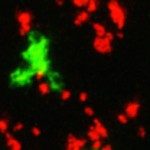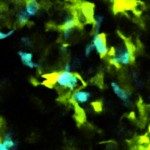Link to Pubmed [PMID] – 23159042
Cell Rep 2012 Nov;2(5):1438-47
Contraction is a critical phase of immunity whereby the vast majority of effector T cells die by apoptosis, sparing a population of long-lived memory cells. Where, when, and why contraction occurs has been difficult to address directly due in large part to the rapid clearance of apoptotic T cells in vivo. To circumvent this issue, we introduced a genetically encoded reporter for caspase-3 activity into naive T cells to identify cells entering the contraction phase. Using two-photon imaging, we found that caspase-3 activity in T cells was maximal at the peak of the response and was associated with loss of motility followed minutes later by cell death. We demonstrated that contraction is a widespread process occurring uniformly in all organs tested and targeting phenotypically diverse T cells. Importantly, we identified a critical window of time during which antigen encounters act to antagonize T cell apoptosis, supporting a causal link between antigen clearance and T cell contraction. Our results offer insight into a poorly explored phase of immunity and provide a versatile methodology to study apoptosis during the development or function of a variety of immune cells in vivo.


